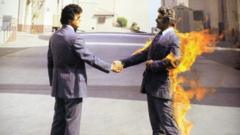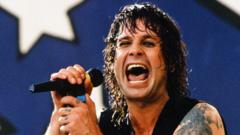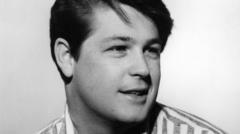Ozzy Osbourne, the iconic figure and frontman of the pioneering band Black Sabbath, has died at the age of 76, just weeks after he gave an emotional farewell performance in his hometown. Known as the "Prince of Darkness," Osbourne's contributions to rock music are immeasurable, with classic hits such as "Iron Man" and "Paranoid" shaping the heavy metal genre.
In a deeply felt statement, his family conveyed, “It is with more sadness than mere words can convey that we have to report that our beloved Ozzy Osbourne has passed away this morning. He was with his family and surrounded by love.” Although the cause of death has not been disclosed, Osbourne faced numerous health challenges, having been diagnosed with Parkinson's disease in 2019.
Born John Michael Osbourne in Birmingham, he dropped out of school at 15 and pursued a music career after a brief period of various low-wage jobs and a stint in prison for burglary. He joined Black Sabbath in the late 1960s alongside legends Tony Iommi, Geezer Butler, and Bill Ward. The band’s self-titled album launched in 1970 paved the way for a slew of success, giving rise to groundbreaking albums like “Paranoid” and “Master of Reality.”
Although he was dismissed from the band in 1978, Osbourne found a new lease on life with his solo career, releasing hits such as "Crazy Train" from his 1980 debut solo album “Blizzard of Ozz.” His audacious live shows earned him a notorious reputation, along with stories that have become rock legends; the anecdote about biting the head off a bat is perhaps the most infamous.
Osbourne's wild lifestyle, marked by drug and alcohol abuse, often teetered on the edge of chaos. Controversies, including a 1989 arrest for the attempted murder of his second wife Sharon, which led to a court-mandated rehabilitation, only added to his complicated legacy. After publicly grappling with his demons, the 2000s saw him reinvented as a reality TV star on “The Osbournes,” showcasing a more relatable family man, a stark contrast to his stage persona.
Despite a debilitating spinal injury from an ATV accident in 2003, compounded by extensive surgeries, Osbourne showed resilience. Determined to make his mark one last time, he performed his final concert on July 5, hosted at Birmingham's Villa Park, an emotional event attended by many artists he had inspired over the years. "You have no idea how I feel. Thank you from the bottom of my heart," he expressed to fans, both present and those tuned in online.
His legacy was cemented as musicians like Phil Anselmo of Pantera recognized Osbourne’s profound influence on the industry, stating, “We would all be different people without Osbourne and Black Sabbath.” His passing has left a monumental void in the landscape of music.
In a deeply felt statement, his family conveyed, “It is with more sadness than mere words can convey that we have to report that our beloved Ozzy Osbourne has passed away this morning. He was with his family and surrounded by love.” Although the cause of death has not been disclosed, Osbourne faced numerous health challenges, having been diagnosed with Parkinson's disease in 2019.
Born John Michael Osbourne in Birmingham, he dropped out of school at 15 and pursued a music career after a brief period of various low-wage jobs and a stint in prison for burglary. He joined Black Sabbath in the late 1960s alongside legends Tony Iommi, Geezer Butler, and Bill Ward. The band’s self-titled album launched in 1970 paved the way for a slew of success, giving rise to groundbreaking albums like “Paranoid” and “Master of Reality.”
Although he was dismissed from the band in 1978, Osbourne found a new lease on life with his solo career, releasing hits such as "Crazy Train" from his 1980 debut solo album “Blizzard of Ozz.” His audacious live shows earned him a notorious reputation, along with stories that have become rock legends; the anecdote about biting the head off a bat is perhaps the most infamous.
Osbourne's wild lifestyle, marked by drug and alcohol abuse, often teetered on the edge of chaos. Controversies, including a 1989 arrest for the attempted murder of his second wife Sharon, which led to a court-mandated rehabilitation, only added to his complicated legacy. After publicly grappling with his demons, the 2000s saw him reinvented as a reality TV star on “The Osbournes,” showcasing a more relatable family man, a stark contrast to his stage persona.
Despite a debilitating spinal injury from an ATV accident in 2003, compounded by extensive surgeries, Osbourne showed resilience. Determined to make his mark one last time, he performed his final concert on July 5, hosted at Birmingham's Villa Park, an emotional event attended by many artists he had inspired over the years. "You have no idea how I feel. Thank you from the bottom of my heart," he expressed to fans, both present and those tuned in online.
His legacy was cemented as musicians like Phil Anselmo of Pantera recognized Osbourne’s profound influence on the industry, stating, “We would all be different people without Osbourne and Black Sabbath.” His passing has left a monumental void in the landscape of music.




















